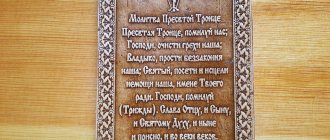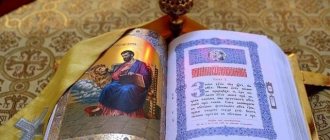Janazah prayer is a Muslim funeral prayer used to see off the deceased on his last journey. The performance of this prayer is included in the category of immutable prayers (fard kifaya), that is, its performance is obligatory, as well as the rituals of ablution and wrapping in a shroud before the funeral ceremony - it is believed that if the prayer is read by only one Muslim man, then it is fard to perform the funeral service prayer will be performed, the rest of those present may, due to ignorance or inability, not perform this prayer.
It is considered a grave sin not to perform prayer over the deceased, and this sin will not be forgiven. Just like other obligatory prayers, funeral prayer is performed only in a state of complete ritual purity - complete ablution and clean clothes are required. The prayer is read in the qiyam position, the text of the prayer is read only to oneself. In this case, the body lies perpendicular to those praying, and those praying with their faces should be turned towards the Kaaba.
Dua for the deceased
All rights reserved َأَنْتَ غَنِـيٌّ عَنْ عَذابِـه، إِنْ كانَ مُحْـسِناً فَزِدْ في حَسَ Translation of the meaning:
O Allah, Your servant and the son of Your handmaid needed Your mercy, and You do not need torment him ! If he did good deeds, then add them to him, and if he did bad, then do not punish him!
Translit: Allahumma, 'abdu-kya wa-bnu ama-ti-kya ichtaja ila rahmati-kya, wa Anta ganiyun 'an 'azabi-hi! In kyana muhsiyan, fa zid fi hasanati-hi, wa in kyana mu-si'an, fa tajawaz 'an-hu!
Performing one funeral prayer for several or more dead people
According to the canons of Islam, if several deceased people find themselves in one place at once, performing janaza prayer is rightly considered correct both in relation to each deceased and simultaneously in relation to all. That is, you can either read prayer over each deceased person, in order of priority, or over everyone at once - no restrictions are made in either the first or second case.
In this case, the jamaat will also gather in several rows behind the imam, and it is also not recommended to mention the dead by name - it is very easy to confuse several names, and there is no disagreement on this among various theologians.
If there is simultaneous prayer over several dead, then they must be arranged in descending order of age, and if the deceased are of different sexes, then men should be arranged separately, in descending order of age, only after them women, in the same order.
Dua for the deceased
اللهُـمِّ اغْفِـرْ لَهُ وَارْحَمْـه ، وَعافِهِ وَاعْفُ عَنْـه ، وَ أَكْـرِمْ نُزُلَـه ، وَوَسِّـعْ مُدْخَـلَه ، وَاغْسِلْـهُ بِالْمـا All rights reserved. ّيْتَ الـثَّوْبُ الأَبْيَـضُ مِنَ الدَّنَـسْ ، وَأَبْـدِلْهُ داراً All rights reserved. ً خَـيْراً مِنْ زَوْجِه ، وَأَدْخِـلْهُ الْجَـنَّة ، وَأَعِـذْهُ مِنْ عَذابِ القَـبْر وَعَذابِ النّـار
Translation of the meaning: O Allah, forgive him, and have mercy on him, and deliver him (from the torment and temptations of the grave.), and show him mercy, and give him a good welcome (that is, make his lot in Paradise good), and make a grave his spacious, and wash him with water, snow and hail, and cleanse him from sins, as You cleanse white clothes from dirt, and give him in return a house better than his house, and a family better than his family, and a wife better than his wife, and bring him into paradise and protect it from the torment of the grave and from the torment of fire!
Translit: Allahumma-gfir la-hu (la-ha), va-rham-hu (ha), wa 'afi-hi (ha), wa-'fu 'an-hu (ha), wa akrim nuzulya-hu ( ha), wa wassi' mudhala-hu(ha), wa-gsil-hu(ha) bi-l-ma'i, wa-s-salji wa-l-baradi, wa nakky-hi(ha) min al-hataya kya-ma nakkayta- s-sauba-l-abyada min ad-danasi, wa ab-dil-hu(ha) daran hairan min dari-hi(ha), wa ahlyan hairan min akhlihi(ha), wa zaud -zhan khairan min zauji-hi(ha), wa adhyl-hu(ha)-l-jannata wa a'yz-hu(ha) min 'azabi-l-kabri wa 'azabi-n-nari! (Feminine endings are given in parentheses when praying for a deceased woman)
Source of the article: https://muslimclub.ru/islam/dua/za-umershego.html
Dua for the funeral of the deceased
According to the Muslim tradition, when you find yourself close to a dying person, at the moment when the deceased’s eyes are closed, it is advisable to turn to Allah with the following prayer:
“Allahummyaghfir (state the name of the deceased) uarfyag dyarajatahu fil-madiyinya uahlufhu fii a’kybihi fil-gabiriyinya uag’firilyanya wa lahu ya Rabbal alyaamiin.
Uafsi lyahu fii kabrikhi ua nyauuir lyahu fiih” This appeal is translated approximately as follows:
“Oh Allah! Forgive (the name of the deceased), raise his rank among those led on the right path, become his successor for those who remain after him, forgive us and him, O Lord of the Worlds! And make his grave spacious for him and illuminate it for him!”
Also, many Muslims know the phrase that should be said when hearing the news of someone’s death:
“Innya lillahi, vya innya ilyayhi rajigun”
The translation of its meaning is as follows:
“Verily, we belong to Allah and to Him we return!”
Immediately after burial, according to Islamic tradition, it is advisable to turn to the Almighty with the following words:
“Allahumma-gfir lahullahumma sabbithu”
What does it mean:
“Oh Allah, forgive him! O Allah, strengthen him!”
Tatar prayer for a deceased mother
Tleu Aty Kuran. Salauaty iman. Aladim Rahim. Pagabayrdan shapagat bulsyn.Amen
Surah Al-Fatiha Aguzu billahi minash-shaitanir-rajim. Bismillahir-rahmanir-rahim. Alhamdu lillahi robbil-*alamin. Ar-rahmanir-rahim. Malikiyaumeddin. Iyaka nagbudu ua iyaka nastagin. Ihdinas-syrotal mustakim. Syrotal-lyazina angamta galaihim. Gairil magdubi galaihim wa lyaddaollin. Amen
Surah Alif.lam.mim Bismillahir-rahmanir-rahim. Alif.Lam.mi-i-im. Valikyal-kitabu la raybya fiih, hudal lilmutakinal lazina yu'minuna bilgaibi. Wa yukimunas salata wa mimma razaknahum yunfikun. Ual lyazina yuminuna bima unzila ilyayka. Ua ma unzila min kablik. Wa bil ahiryatihum yukiunun. Ulyayaika *ala hudam mir-rabbihim, Uya ulayaika humul muflihun. Wal hukmu shahun wahidul la ilaha, illya huarr rahmanur-rahim. Amil
Surah Ayatu-l-kursi Bismillahir-rahmanir-rahim. Allahu la illahi, illya hual khayyul-qayyum. La tahuzuhu sinat wa la naum. Lahu mafis Samauati ua mafil ard. Man zyal-lyazi yashfa gu indahu illya bi-iznih. Yalamu ma baynya aidihim. Wa ma halfahum. Wa la yuhituna bi shaim min ilmihi. Illa bima shaa wasia kursiyhus samauati. Wal ard. Wa la yauduhu hifzuhuma, wa huual alliyul gazim. Amen
Sura Ya-sin 1. Yasin, 2. walqur'anilhakimi 3. innakalaminal mursalina 4. g'ala siraddin mustakim. 5. Tanzilal ghazirrakhim. 6.Li tunzira kauman ma unzira abaukhum fakhum gafilun. 7.La qad haqqal qaulyu gaala aksarihim fakhum la yu'minun. 8. Inna jag'alnya fi ag'nakihim ag'alalyan fahiya ilal azq'ani fakhum mu'mahun. 9. Uajag'alna mimbaini aidihim saddan, uamin halfihim saddan, faagshainahum fakhum la yubsirun. 10. Wasaua un g'alaihim a anzartahum amlam tunzirkhum la yu'minun. Inna ma tunziru manitabagazikra uakhashchiyarrahmana bil gaib, 11. fabashirhu bimmagfiratin waajrin karim. Inna nakhnu nuhyi mauta uannaktubu ma qadda mu asarahum 12.ua kullya shayin, ahsaynahu fi imamin mubbin. Surah Al-Ihras Bismillahir-rahmanir-rahim. Kul huu Allahu ahad. Allahu samad. Lam iyalid. Wa lam yulyad. Wa lam iakullahu kufuan ahad. Allahu Akbar. Amen (read the surah 3 times)
Surah al-Falyak Bismillahir-rahmanir-rahim. Kul aguzu birrabil falyak. Min sharri ma halyak Ua min sharri gasikin izya uakab. Ua min sharrin naf-fasati fil gukad. Wa min sharri hassidin izya hasad. Amen
Surah an-Nas. Bismillahir-rahmanir-rahim. Kul aguzu birrabin us. Malikin us. Ilyakhin us. Min sharill wasuasil khan-nas. Allyazi wasuisu fi sudurin us. Min al jinnati one-us. Amen.
Next, read the following (this is as a result, so that the Almighty accepts your prayer) Sadaqa-Allahul gazyim. Subhana rabbiqa-rabbil Izzati amma ya-sifun. Wa salamun ala mursalin. Alhamdu lillahi robbil galyamin. Amen
After completing your prayers, ask the Almighty for forgiveness for the sins of your loved ones. Tell whom you dedicate these prayers to and list the names of the deceased. Then you can ask the Almighty for your desires. And at the end say Rabbana atina fidduniya hasanata. Wa fil akhirati hasanatan wa kinya gezabenar. Birakhmatika rahmanir rahim, alhamdu lillahi robbil galyamin
Source of the article: https://vk.com/topic-58111319_28887716
What prayers to read at Muslim funerals
According to Muslim traditions, the funeral of the deceased should be carried out as quickly as possible. The Prophet Muhammad said that the procedure for interring the body should not be delayed. If the deceased was a good person, then the sooner he is buried, the sooner he will be able to taste the benefits of heavenly life. If the deceased did many bad deeds during his lifetime, then a quick burial will allow him to throw evil off the shoulders of his family and friends.
Funeral rites in Islam are called janaza. The procedure for carrying it out is described in the Sunnah of Muhammad. The relatives and friends of the deceased are responsible for performing the ritual, for whom the funeral is a religious obligation (fard). If the deceased has no relatives, then Muslims who became aware of the death of this person should bury him.
Muslim funerals consist of several main stages:
- Preparation. Before death, a person recites the Shahada. If he is unable to do this, then it is whispered in his ear.
- Ablution. The body of a deceased Muslim is washed 1 to 3 times. At least 44 people perform the procedure.
- Dressing in a shroud. Islamic traditions prohibit burying the dead in clothes. The deceased is wrapped in a special shroud made of white cloth.
- Funeral prayer. It is read by the imam of the mosque or the person who replaces him. Namaz is performed standing, without bowing to the ground or bowing from the waist.
- Burial. It is customary to bury the deceased on the day of death or the next day. Muslim customs do not require the use of a coffin. The deceased is placed in a spacious grave on his right side so that the body is directed towards the Kaaba. The niche with the deceased is covered with boards and then covered with earth.
- Marking of the grave. Religious authorities oppose placing any markers near the burial site. But most Muslims adhere to the tradition of setting gravestones with names, as well as dates of birth and death.
In Christian cultures, a funeral is usually followed by a wake. There is no such tradition in original Islam. But there is still an analogue of the funeral dinner among Muslims in the CIS countries and in some other parts of the world. Many believers in Allah arrange memorial meals on the 3rd, 9th and 40th day after death. Islamic religious authorities generally disapprove of such practices, calling them borrowing from Christians. Also, most imams are categorically against luxurious feasts during funerals. Cooking is generally considered optional. According to Islamic teachings, for the first three days after a person's death, eating in his home is prohibited. It is believed that Muslims should help the relatives and friends of the deceased both financially and spiritually, and not eat them up.
The general principles of Muslim funerals are as follows:
- the funeral meal should be modest. Magnificent feasts in Islam are held only in honor of joyful events. In addition, the wake should not be a heavy financial burden for the family of the deceased. Many spiritual fathers advise friends and acquaintances of the deceased to bear the costs of organizing a memorial meal;
- Patience is one of the main virtues of a Muslim. Therefore, during the funeral meal there is no need to loudly and publicly mourn the deceased or lament. The ritual takes place in silence and calm. Idle talk is not welcome;
- The mullah should be invited to the funeral. The instructions of your spiritual father will help you correctly accept the death of a loved one. It is not customary to make table speeches about the deceased. Those present should focus on the prayers for the soul of the deceased, which are read by the mullah;
- Until recently, women were not allowed to attend the funeral dinner. Nowadays this tradition is not usually observed. At the same time, men and women are seated separately from each other - for example, at different tables or even in different rooms. Children are not allowed to attend the funeral;
- It is customary to give alms (haer) at the funeral table. Donations can be money, tea, scarves, soap;
- Alcohol is strictly prohibited at funerals. But serving sweets - persimmons, cookies, raisins and others - is welcome. Such dishes are believed to symbolize the sweetness of the afterlife for the deceased;
- those present at the dinner must wear white clothes. Wearing outfits in dark colors is not allowed.
For those who wish to remember according to the Koran, one should remember the words of the Prophet Muhammad:
The first funeral dinner is held on the day of the funeral. According to the sacred texts of Islam, the soul of the deceased at this moment still resides on earth. She is experiencing great suffering, which can be alleviated by respect and prayers from relatives, friends and loved ones. There are no special requirements for preparing funeral dishes in the Muslim tradition. You need to be guided by personal preferences and local culinary customs. For example, the Tatars usually serve pilaf, lamb soup with noodles. Kazakhs usually prepare national dishes - talkan, tar, baursak.
In addition to the day of the funeral, it is customary to arrange a wake on the 7th and 40th day. Some Muslim societies also hold funeral ceremonies on the 3rd, 36th and 51st days of death. The meaning of ritual dinners may vary depending on the national customs of the Muslim community. Some believe that a wake helps the soul earn forgiveness from Allah and get a place in heaven. In other societies, funeral dinners are intended to endear the spirit of the deceased to the living. These ideas are rooted in paganism. According to these beliefs, if you appease the soul of the deceased, it will help relatives and friends in various matters.
In almost all Muslim societies, it is customary to remember the deceased one year after death. It is believed that it is at this time that the soul finally leaves the earthly world. There are a large number of traditions and rituals that are usually performed on the anniversary of death. Usually on this day all relatives, acquaintances and neighbors are invited. It is recommended that the funeral meal be held very modestly, but Muslims often organize lavish feasts. They symbolize the end of the period of mourning, during which weddings and other celebrations were prohibited in the house of the deceased.
Islam is one of the most widespread religions in Moscow, second only to Orthodoxy in the number of believers. The religious and cultural traditions of this religion are diverse, so even devout Muslims sometimes do not know some of their nuances. Thus, a funeral in accordance with the traditions of Islam is a complex set of rituals that requires the participation of a clergyman. Our article will help you learn more about how Muslims are buried.
When relatives are sure that death has occurred, they place the deceased on his right side, facing towards Mecca. It is also permissible to place the deceased with his feet towards Mecca and raise his head. Islamic traditions require that the body of the deceased be taken care of and given proper appearance. To do this, you need to stretch your joints, put a weight on your stomach (to prevent bloating), tie your jaw (you don’t want it to open randomly) and lower your eyelids. When the fact of death is established, the relatives of the deceased should offer a prayer to Allah for the forgiveness of the sins of the deceased and the consecration of his grave.
Ablution is a complex ritual procedure required at the funeral of every Muslim. To carry it out, four people of the same sex as the deceased are required - an exception is possible for spouses. The ablution itself is carried out by only one person, who is called a hassal - usually this is either a close relative or a specially hired person. The task of the assistant hassal is to pour water on the deceased (water with cedar powder and clean water is used), while other participants in the procedure support and turn the body over.
Ablution begins with the deceased being placed on a hard bed (the kind you can get in a mosque) facing towards Mecca, and a rag or towel is placed on the hips, thereby covering the genitals. Since ablution cleanses the intestines, the room should be fumigated with incense. Ablution consists of several stages. First, the deceased needs to wash his head and face, followed by his feet up to the ankles. Then the deceased is alternately placed on his side, washing the right and left sides of the body. The procedure ends with washing the back. The deceased cannot be placed on his stomach - to wash his back, his body is raised by the hassal's assistants. Washing the deceased more than three times is considered unnecessary.
After the deceased has been washed, he is dressed in a special shroud called a kafan. A man's shroud consists of several items: a lifafa - a fabric that covers the body from head to toe, an izar - a fabric that is used to wrap the lower part of the body, and a kamis - a long shirt that covers the body from the shoulders to the pelvis. A woman's kafan also includes a khimar, a wide scarf to cover the head, and a kirk, a cloth that is placed on the chest. It is customary to sprinkle the Lifafa with incense to cover up any possible smell of decomposition.
It is customary to bury the deceased on the day of death. After the deceased has been washed and dressed, he is placed on a tobut (special funeral stretcher). The body on the tobut is referred to the place where the funeral prayer (janaza) is performed. This prayer is different in that it is held outside the walls of the mosque, all its participants pray standing, and the body of the deceased is placed in front of the imam so that his face is turned towards Mecca. As part of the prayer, participants ask Allah to forgive the sins of the deceased and grant him His mercy. If the janazah was not performed, then from the Islamic point of view the funeral cannot be considered valid.
After performing janaza, the body of the deceased is taken to the cemetery on tobut, where the funeral takes place (daphne). In Islam, graves are used that differ from those accepted in Christianity and Judaism - in Muslim graves special niches are made, called lahad. The body of the deceased is immersed in the grave under the reading of verses (Sura Al-Mulk is most often used) and placed in the lahad so that the head looks towards Mecca, after which the lahad is covered with bricks or boards. Islam disapproves of tombstones, so grave monuments are designed extremely modestly; as a rule, only the name of the deceased, his years of life and a surah are indicated on them. All grave monuments must face Mecca. It is noteworthy that women are usually not allowed to attend funerals. The Koran also prohibits burying Muslims in non-Muslim cemeteries, and representatives of other religions in Muslim cemeteries.
There are several Muslim cemeteries in Moscow, as well as Muslim plots in non-Muslim cemeteries. Such a division is prescribed by the Koran, which prohibits burying Muslims in cemeteries of other religions, and vice versa. The number of active Muslim cemeteries in Moscow includes Danilovskoye Muslim and Kuzminskoye. The oldest Muslim cemetery in the capital was the Tatar cemetery outside the Kaluga Gate, but it has not survived to this day. In the 1980s, Muslim sections were created at the Butovsky, Volkovsky, Domodevsky, Zakharyinsky, Shcherbinsky cemeteries and in a number of other necropolises.
You might be interested:
In the Islamic religion, great importance is attached to the topic of death. In order for Allah to forgive the deceased’s sins and allow the soul to be in paradise, relatives read prayers performed with open palms, not touching each other. The text of the dua for a deceased Muslim varies depending on the situation: there are duas for a child, relatives, for reading near the deceased.
When closing the eyes of the deceased, a prayer sounds:
Allahummyagfir (name) uarfyag dyarajatahu filmadiyinya uahlufhu fiiakybihi filgabiriinya uagfirilyanya walyahuya rabbyal alayamiin. Uafsi lahufii kabrihi uanyauuir lahufiih.
Dua means turning to Allah with a request to forgive the deceased, promote him among the faithful, and become a successor for descendants. The text asks for forgiveness of sins and ends with a request for a spacious grave for a deceased Muslim.
When hearing about a person’s death, they say the following phrase:
We belong to Allah, and truly we return to him.
In the transliteration, the text of the dua for the deceased reads:
InnyaliLlyahi, vyainnya ilyayhi ajigun.
Muslim prayers for the dead are read before burial and after the funeral. At the end they say the dua:
Allahumma gfir lahullahumma sabbithu.
The text asks for forgiveness and strengthening of the soul of the deceased. The Prophet Muhammad addressed the relatives of the deceased after the funeral with advice to pray for the deceased and ask for strengthening of spirit. According to Muhammad, after burial the soul of the deceased Muslim was asked questions and put to the test. Prayers make this step easier.
Duas are heard all the time at Muslim funerals. Read after the third takbir of the funeral prayer. Turning to Allah makes the posthumous fate of the deceased easier. After the fourth takbir, dua is read at the funeral for devout Muslims.
In Islam, the commemoration of the dead plays an important role: they are remembered and special duas are pronounced.
Examples of funeral prayers:
Allahummyagfirlyahu uarhyamhuuagafihi wagfu anhuuaakrim nuzullyahuua wassi mudhalyahu waagsilhu bilmyai wassyljiuabyaradi uanyakkyhi minyalhataayakyamya nyakkaytyalsyaubalabyada minyaddyanyasi waabdilhu dyaran hairan mindyarihi waahlal hairan minakhlihi uazyaujyan hairan minzyaujihi waajilkhuljyannyatya uaaginzhu minazabilkabri uaazyabinnyar.
Text of a dua asking for mercy, a good reception for the deceased. A request to provide all kinds of mercy to the deceased Muslim, to forgive sins and bad deeds, to cleanse the soul like clothing. Allah is asked to grant the soul a new home, a spouse and a happy family, enter it into paradise and prevent fiery torment.
Allahummyagfir lihiyanyaua myyitinya uashyakhidinya uagaibinyaua sagyirinya uakyabiirinya uazyakarinya uyaunsyanya. Allahummyamyan ahyaytyahuminnya fyaahyihi alalilisli uamyantyauyaffyaytyahu minnya fatyauaffyahualalyimyan. Allahummala tahrimnya ajrahuuala tudylyanyabyadah.
The meaning of the text of the dua: a request for forgiveness from Muslims present at the reading and those absent. The prayer speaks of faith for the dead, life according to Islamic laws for the living, asking to be shown the right path and rewards for trials.
Allahummyainnya (name) fiizimmyatikya hyablijyavyarikya fakyhi minfitnyatilkabri uaazaabinnnyari uaantya ahlulvafyai valhyakk. Fyagfirlyahu värhyamhyinnyakya antyalg'afururrahiim.
The meaning of the text: a request to save a deceased Muslim from the temptation of the grave. Dua asks for forgiveness and mercy. Allah is called upon to protect the deceased.
Allahummya abdukyabnyu amyatikya ikhtyadzhyayil rahmyatikya uaantyaganiyun anazyabihi inkyanyamuhsinn fazidfii hyasyanatihi uainkyanyamusiyan fyatajyauzzanhu.
The dua talks about the mercy that the deceased needs. The mercy of Allah, who does not need the suffering of the deceased, is invoked; a request is made to forgive dashing deeds and reward for good deeds.
There is a separate Muslim funeral prayer. It is read by Muslim women whose child or infant has died. Text:
Allahummyajalhu lanyafyaratan wasyalafyan wahajran.
Meaning of dua: prayer for the fate of a child. We pray that he ends up in heaven before his parents and meets them there.
Visiting a graveyard, planting plants, flowers, trees at a burial site is sunnah. Headstones on the graves of the deceased are made modest, with the name, dates of life and death of the deceased. Surahs of the Koran may be engraved on monuments.
When entering the cemetery, say the following text:
Assalamu alaikum ahladdiyari minalmuminina valmuslimin. Vainn inshaAllahu lalyahikun. Asalullaha lanava lakumulafiya.
This dua is a greeting to Muslim believers buried in a cemetery. It expresses the belief that the living will join them, a request for well-being for the living and the dead.
Sometimes they say the text:
Assalamualaikum yaaahlilkubur. Yagfirullahulanahualakum. Antum salafuna, uanahnubilasaar.
This is a wish of peace to dead Muslims, a request for forgiveness, an appeal to those buried in the cemetery.
The ruling of the funeral does not legitimize the distribution of refreshments to save the soul of the deceased. However, relatives or neighbors can prepare food and bring it to the relatives of the deceased who are involved in the funeral
For the good of the souls of Muslims, protecting them from the temptation of the grave and fiery torment, you can read suras about the deceased:
The texts of surahs can be read over the burial of a Muslim. Such actions have great power; they ease the fate of the soul and grant it salvation.
Reading the Koran at the grave is necessary. The punishment of the dead is facilitated on the day of reciting dua and other sacred texts of Islam. You can give savvab to the deceased and make dhikr. You can perform Hajj on behalf of the deceased; there is no prohibition on this.
Reading the Koran is allowed in the original, in Arabic and in transliteration. If a Muslim does not speak Arabic, he must pronounce the words of the dua in transliteration, but understand and know the essence of the surahs. Reading a text without understanding the meaning is not beneficial.
There is a separate verse in the Quran that describes how future generations of Muslims pray and ask for forgiveness for the actions of deceased relatives. This text is an example of how to remember the dead. Scholars and muffasirs argue: if the reading of the Quran and funeral duas were meaningless and useless, the verse would not have been revealed according to the word of Allah.
Although the list of lifetime deeds is complete, it is impossible to add new ones, there are three deeds that will bring the deceased a reward after death:
- a well-mannered child who will not forget about his parents will pronounce funeral duas for his mother or father;
- creation of knowledge pleasing to Allah;
- alms used by the people who receive it.
Another fact testifies to the benefits of reading the texts of the Koran at the grave of a Muslim or funeral duas. A funeral prayer is a request for forgiveness of the deceased, to rid him of his sins. The Prophet Muhammad also spoke about the need for reading.
There is a rule in Islamic law that allows pilgrimage to be performed on behalf of a deceased Muslim. This is a useful addition to the recitation of dua for the dead and funeral prayers.
The collection of Imam Muslim contains a hadith. It says that Muslims who come to funeral prayers stand up for the deceased. If at least a hundred people come, Allah accepts intercession.
Dua for the dead is a Muslim way of remembering loved ones and making their posthumous fate easier. They read the texts at home, in a mosque or in a cemetery. Don’t forget about good deeds - part of the reward is attributed to older relatives and parents after death.
Prayers for deceased Muslims
121 messages
Tleu Aty Kuran. Salauaty iman. Aladim Rahim. Pagabayrdan shapagat bulsyn.Amen
Surah Al-Fatiha Aguzu billahi minash-shaitanir-rajim. Bismillahir-rahmanir-rahim. Alhamdu lillahi robbil-*alamin. Ar-rahmanir-rahim. Malikiyaumeddin. Iyaka nagbudu ua iyaka nastagin. Ihdinas-syrotal mustakim. Syrotal-lyazina angamta galaihim. Gairil magdubi galaihim wa lyaddaollin. Amen
Surah Alif.lam.mim Bismillahir-rahmanir-rahim. Alif.Lam.mi-i-im. Valikyal-kitabu la raybya fiih, hudal lilmutakinal lazina yu'minuna bilgaibi. Wa yukimunas salata wa mimma razaknahum yunfikun. Ual lyazina yuminuna bima unzila ilyayka. Ua ma unzila min kablik. Wa bil ahiryatihum yukiunun. Ulyayaika *ala hudam mir-rabbihim, Uya ulayaika humul muflihun. Wal hukmu shahun wahidul la ilaha, illya huarr rahmanur-rahim. Amil
Surah Ayatu-l-kursi Bismillahir-rahmanir-rahim. Allahu la illahi, illya hual khayyul-qayyum. La tahuzuhu sinat wa la naum. Lahu mafis Samauati ua mafil ard. Man zyal-lyazi yashfa gu indahu illya bi-iznih. Yalamu ma baynya aidihim. Wa ma halfahum. Wa la yuhituna bi shaim min ilmihi. Illa bima shaa wasia kursiyhus samauati. Wal ard. Wa la yauduhu hifzuhuma, wa huual alliyul gazim. Amen
Why is it important to read dua for the dead?
Deceased parents and relatives need the living to read dua for them. The earthly journey is over, the deceased goes to the afterlife with the burden of his sinful deeds. Through prayers from the Koran for the deceased, you can convey to Allah a request to forgive the deceased for his misdeeds and to grant rewards for good deeds.
Duas read by relatives contribute to the remission of sins of the deceased and ease his fate in the other world. The beginning of the journey is considered to be the placement of the body of the deceased in the grave. The soul is separated from the physical shell, but the dead person feels, sees, rejoices, and is sad. Supporting loved ones for the soul of the deceased through reading duas and surahs is a ray of light.
The Messenger of Allah Abu Dawud said that all the affairs of the deceased cease. The exceptions are continuous alms, knowledge gained by people that is useful for society, and the prayers of children for their parents.
For whom the funeral prayer is not performed
According to the basic teachings of the Hanafi madhhab, janaza is not performed on:
- Prayer is not performed over deceased representatives of other religions (for example, if the deceased was a Russian Orthodox Christian);
- Those who took up arms against the ruler and were killed during the battle. It is believed that those who rebelled against the ruler are equal to parricide, but those of the troublemakers who were convicted and executed must be washed, and prayers are also performed on them;
- Bandits killed during capture also do not have the right to pray over them. But at the same time, those executed by court decision are washed and buried with the reading of a prayer according to the traditions of Islam;
- The murderer of his parents, executed by court decision, is not subject to burial in accordance with the canons of Islam. That is why the imam has every right to refuse the relatives of the deceased ablution and recitation of the funeral prayer. But if the killer died himself, without the intervention of third parties, it is believed that the Almighty punished him for the sin he committed, as a result of which ablution, prayer and burial are carried out in accordance with the canons of faith.
- Contrary to opinions, janaza can also be read over a suicide - according to the canons of various madhhabs, such a person did not commit crimes against anyone, but the Prophet (saw) once refused to read the funeral prayer over a suicide, showing contempt for the act committed by the deceased.
Texts in Arabic and how to read dua for a deceased Muslim
All offered duas for the dead are best done at the moment of greatest likelihood of being heard by Allah. Favorable days for prayer are Friday, Eid al-Fitr, sunrise and sunset of each day. The Prophet Muhammad said them when performing janaza prayer (funeral prayer); it is permissible to perform a prayer service for a deceased loved one at any appropriate time.
The dua at a Muslim funeral should be read in the same way as the prayer of the Prophet, because his words of the Sunnah contain the correct sayings according to the will of Allah, they are the most accurate and true.
Before death
For a dying person, before death, it is necessary to read dua in Arabic to ease the path to eternal life. Text of the prayer:
“AllahummaGfir LaKhu (LaHa), VaRham-Khu (Ha), WaAfiKhi (Ha), WaFu 'AnKhu (Ha), WaAkrim NuzulyaKhu (Ha), WaVassi' MudhalaKhu (Ha), WaGsil-Khu (Ha) BilMa'i, VaS -salji ValBaradi, VaNak-KyKhi (Ha) MinAl-KhatayaKya-MaNakkaytaS-SaubalAbyada MinAdDanasi, WaAbDilKhu (Ha) DaranKhairan MindariKhi (Ha), VaAkhlyanKhairan MinAkhliKhi (Ha), VaZaud-ZhanKhairan MinZaujiKhi (Ha ), VaAdkhylKhu (Ha) LJannata WaA' YizKhu (Ha) MinAzabilKabri VaAzabiN-nari.”
In the text of the dua prayer, requests are made to Allah to forgive, have mercy, and deliver a dying man (woman) from the torment. By the grace of the Almighty, the prayer calls for a blessing on a spacious grave washed by waters, forgiveness of all sins, and in paradise to give shelter, a family, and the best wives. The translation tells of a request to protect the deceased from the torment of being in a cemetery and being burned by fire.
To get rid of the suffering of a dying person and grant a painless death, the following dua is pronounced:
“Allahumma, 'AbduKya VaBnu AmaTiKya IkhtajyaIlyaRahmatiKya, VaAnta GaniyunAn 'AzabiKhi! InKyanaMuhsiyan, FaZidFi HasanatiKhi, VaInKyana MuSi'an, FaTajawaz 'AnHu'.
For condolences
It is customary to express condolences to the relatives of the deceased in the first days of death before burial, when grief and visiting misfortune are a morally difficult test for loved ones. The Prophet Muhammad said that those who express sympathy are given a reward. The hadith says that if condolences are brought from relatives by blood or religion through dua, then the Almighty on the Day of Judgment will cover him with clothes that personify the generosity of a person.
When expressing words of support to the loved ones of the deceased, you should recite the text of the dua for condolences in Arabic:
"InnaaLilLyayahi VaInnaa IlayhiRaaji'uun."
The Holy Scriptures of the Koran say that human life will certainly be subject to trials that bring tears, which will help to reveal the moral level of the soul and the awareness of the acts committed. The prophet says that the Lord protects the steadfast and unshakable. In case of trouble, you should say the words of the dua:
“We are at the mercy of God. We will return to him."
Deceased parents up to 40 days
The commemoration of the deceased on the 40th day after the funeral takes place in the form of a meal in 2 rooms - separately for men and women. It is not customary to talk and show tears, but silently saying a prayer is respected, provided that the prayer has been performed the day before.
Muslim duas for deceased parents up to 40 days can be heard in 3 versions:
“LaIlahaIllallahul—AzymulHalima, LaIlaha Illallahu, Rabbul-Arshil—Azymi, LaIlahaIllallahu, RabbuSsamavati, VaRabbuLArdiWa RabbuL-Arshi-LKarimi.”
"Allahumma, RakhmatakyaArju, FaLaTakilni IlyaNafsi TarfataAinin VaAslih LiSha'niKullyahu, LaIlyaha IllyAnta."
"AllahuAllahu, RabbiLa UshrikuBhiShay'an."
For your peace
Dua is pronounced when the deceased's eyelids are closed. The prayer asks the Almighty to forgive, to elevate the soul of the deceased on the right path, to direct him to heaven, and to make the grave spacious:
What is dua?
In a general sense, dua is a personal prayer of a Muslim addressed to Allah in his native language. Dua is not exactly a prayer in the Christian sense of the word - in Islam, a strict prayer form of addressing God is namaz, which must be read in Arabic - it is simply one of the varieties of worship of Allah and at the same time a valid expression of the specific life requests of the person praying. However, in the Russian language this terminological difference is absent, and therefore both words - dua and namaz - can be translated as “prayer”. According to tradition, dua is usually pronounced in various everyday situations - starting a new business, expressing concern for someone, being in need or fearing something.
Is it possible to use dua to help a deceased person?
There are both supporters of the idea that dua can help the deceased and opponents. As an example in favor of the need to say prayers, a verse of the Koran is given, which speaks of the compassion and mercy of the Lord towards people who are initiated into the faith before those who pray. The verse confirms that one can ask for forgiveness for ancestors who have left the world; the effectiveness of prayer has been proven.
Among the opponents of the theory about the possibility of influencing the path of the soul of the deceased with the help of prayers, the following arguments are presented:
- a Muslim should not hope to receive his own benefits at the expense of a dua from another believer;
- the deceased receive only those rewards that they themselves achieved;
- according to the interpretation of the suras of the Koran, on the Day of Judgment, descendants will put righteous deeds on the scales of their ancestors.
Every person has the right to count on a dua and a good word from the lips of his children after death, but it is more important to go through the path of life without succumbing to temptations and the fall. Love for God and harmonious coexistence with people will open the way to heaven.
Collective dua for the deceased after burial
In some cases, after burial, Muslims can be seen reading dua for some time next to the grave. This is not directly prohibited by any canons, but on the contrary, as reliable hadiths convey, it is considered sunnah, according to the words of the Prophet (saw). One of the hadiths reports the following words of the Prophet (saw):
“Ask the Almighty for your brother, ask for his forgiveness and firmness in answering to Allah.”
We recommend reading → How Muslim women dress at home - appearance without a hijab
Thus, making deliberate collective dua at a burial site is not frowned upon, but rather encouraged. At the same time, a collective unintentional dua, performed not according to the original intention of the worshipers, but pronounced spontaneously, is considered condemnable.
Prayer for the repose of the soul of the deceased in Orthodoxy
When a loved one passes away, it is an irreparable grief. But the loss of a loved one must be overcome, no matter how difficult it may be, and move on. It is believed that the worst thing is when parents have to bury their children. But it can hardly be said that it is less difficult for children to say goodbye to their beloved parents forever. The mental pain from the loss of other relatives can also be unbearable.
When they say that time heals, this is a false statement. The pain of losing a loved one remains in a person’s soul for the rest of his life. But it dulls not because time passes, but because the emptiness in the soul gradually begins to be filled with various everyday worries. But at the same time, a loved one will always be missed, and from time to time each of us tries to mentally communicate with our loved ones.
How to pray for the newly deceased, so that the soul goes to heaven
Of course, when a loved one passes away, you don’t want to accept this fact. But we should remember that our emotions, feelings and suffering do not allow the deceased to calmly pass into another world. We do not let go of his soul from us and this greatly harms him. This is due to the fact that the soul of the deceased rushes about and cannot find its place. In the first days after a person’s death, she simply hovers in space. Therefore, the task of the relatives is to release the soul of the deceased from themselves and help it take its place in Heaven.
- Immediately after death, order liturgies and memorial services in the church within 40 days.
- Be sure to arrange a wake on the 9th and 40th days. This is due to the fact that on these days the soul of the deceased appears before the Lord. The more living people remember about the deceased these days, the better.
- Every day at home for 40 days you need to pray at home for the repose of the soul of the deceased. Whether your loved one goes to heaven depends on this.
Remember that it is very important to pray for the repose of the newly deceased within 40 days after his death. But we must also remember to offer prayers for the repose later. There are special days for this. This will not only help the soul of the deceased find peace, but will also allow you to calm down from an irreparable loss and cope with grief.
An effective prayer goes like this:
How to order a magpie and a memorial service for the deceased in church
Losing a loved one is a very difficult event. But you need to understand that nothing can be changed. In difficult moments of life, you need to remember that with some of your actions you can help the soul of the deceased quickly find peace in Heaven. For this purpose, first of all, on the main dates associated with departure to another world, a church memorial service is ordered. And for the believer it is of great importance, as it allows one to survive grief. A memorial service is a service held on the third, ninth and fortieth days after a person’s death.
- Visit the temple in advance.
- Leave the offering on the funeral table.
- Write a note with the name of the person you want to remember and give to the priest.
- Tell the priest on what day you would like to order a memorial service.
It is believed that on the ninth day the soul of a deceased person will appear before the Lord and await the arrival of the nine angelic ranks. On this day, the purpose of the memorial service in the church is to ask the Almighty to help the soul of the deceased get closer to the holy angels. During the funeral service, all believers in the temple must hold lit candles in their hands. In this way, sincere love for the deceased is expressed, which is necessarily read out by the Lord at the Fair Judgment. A memorial service for 9 days can be held in different churches.
On the fortieth day, the soul of a deceased person, after walking through hell, ascends to God for the third time. At this moment her fate will be decided. This decision largely depends on the earthly deeds of the deceased person, but prayers for the repose of the soul, which were offered by relatives throughout the entire time after death, also play an important role.
A memorial service can also be ordered for the anniversary of death. But this memorial event is not obligatory.
Very often, to calm their own souls, people order magpie for the deceased. This ritual is a special type of remembrance. For repose, the magpie is ordered for 40 days, six months and a year. For 40 days, a prayer is read in church for the repose of the deceased, and it is during this period that the deceased’s sins are absolved.
Who should I light a candle for the repose of my father and mother?
Candles for the repose are placed on a special eve table. This design is usually installed to the left of the entrance. The table is covered with a metal or marble board. It is easy to recognize, since there is a rectangular candlestick on it, on which the Crucifixion of the Lord is installed. If for some reason there is no such table in the church, then you can put a candle for the repose of your father or mother near any icon. But it is very important not to do it thoughtlessly. It is necessary to remember the deceased and stand in silence for a while near a lit candle.
When you light a candle for repose, you must follow the following rules:
- Cross himself twice at the Crucifixion of the Savior.
- Light a candle from other burning candles or from a lamp.
- Place the lit candle in a free cell and secure it so that it does not tilt or come into contact with other candles.
- After installing the candle, you need to whisper the following words: “Rest, O Lord, the soul of your departed Servant (name).”
- Cross yourself and bow.
Procedure
The deceased must be completely washed, stripped naked and wrapped in a kafan (funeral shroud). After this, the deceased is placed on a tobut, and the imam (or the closest male relative of the deceased) stands at the level of his chest near the body. The rest stand at a distance behind the imam, in three or more rows. The imam reads takbir and namaz in a quiet voice, while the jamaat reads in a whisper or to himself.
First of all, the niyat is pronounced: “I am going to perform janaza prayer for the deceased lying in front of me” (issues of the gender identity of the deceased are not so important), then the takbir is pronounced, during which the worshiper touches his earlobes with his fingers, after which he lowers his hands and takes the “kyyam” pose. After this, the worshipers recite the following text (transliterated from Arabic):
“Subhanaka Allahum ma wa bihaamdik, wa tabarakaa smuq, wa taalaya jadduki, wa laa illahi gairuk”
After this, they begin to perform the second takbir. When reading the second and subsequent takbirs, the hands do not rise, remaining in the abdominal area. After performing the second takbir, the jamaat reads “Salavat” after the imam. After reading “Salavat”, the imam pronounces the third takbir, after which the dua janazah is read:
“Allahum ma firlihayina wa mayitina wa shakhidina wa gayibina wa zakarina wa unsanaa wa sagirinaa wa kabiirina. Allahum ma man ahiyaitaahu minnaa faahhiy aalal Islam. Wa man tawaffaitaahu minaa fatawafahu aalal iman.”
If those praying do not know this dua, then it is permissible to read the dua “Qunut” or “Rabbana”. After reading the dua, the fourth takbir is pronounced, after which salam is performed - a prayer greeting in Islam, without making separate duas.
Following the greeting, a dua is pronounced, which indicates the gender of the deceased for the Almighty. To pray for a man, say “Wa husa hazal maiyita bir ruhi uar-rahhatiy wal-magfiraatiy uar-ridvaniy.” Allahum ma in kana muhsinaan faziid fi ihsanihi wa in kana musiyan fatajawaaz aankhu wa lakkahil-amnaa wal-bushraa wal-karamata waz-zulfaa birahmatikaa iya arhamaar rahimin.
If the deceased is a woman, another dua is read, the text of which looks slightly different:
Recommended reading → Basic information about prayer after sunrise (hell of the spirit)
“Wa husa hazihiil maiyitata bir ruhi uar rahhatiy wal-magfiraati uar-ridvaniy. Allahum ma in kanat muhsinaatan faziid fi ihsaaniha wa in kanat musiaatan fatajawaaz aankha wa lakkahal-amnaa wal-bushraa wal-karamata ua-zulfaa birahmatikaa iya arhamaar rahimin.”
If the deceased is a minor boy, then another dua is read: “Allahum ma jaalhu laana furaatan wa jaalhu laana ajraan wa zukhranwaa jaalhu laana shafiaan wa mushaffaa.”
But in the case of a minor girl, the dua is read “Allahum ma jaalha laana furataan wa-jaalha laana ajraan wa zuhraan wa-jaalha laana shafiaatan wa mushaffaa”
Those who do not know how to perform Janazah prayer are allowed to read the dua “Rabbana”. It should be especially borne in mind that it is better to name the deceased person’s name exactly in the intention - otherwise the prayer will not be considered completed. That is why, if the name of the deceased is unknown, it is enough to limit the intention to the word “deceased”.
Funeral prayer for the repose
A memorial prayer for the repose is special words aimed at calming the soul of the deceased. By praying for repose, we not only invisibly help the deceased, but we ourselves are consoled in our grief. All this is connected with Christian canons, in which death is not endowed with a tragic meaning.
Full text of the prayer
The full text of the prayer for repose is as follows:
A deceased person must be commemorated on special days provided for by the church. But besides this, he needs to be remembered on his birthday, the day of his death and on the day of the angel. On these days, if possible, you should visit the church and take donations. It is also recommended to give alms to the poor on memorial days, and you should ask them to remember the name of the deceased relative when they pray.
Short version
A short version of the prayer for the repose is very often used. It is often said in a cemetery near the grave of the deceased on memorial days. But it is more important to pronounce them in the period after forty days after the death of a loved one.
It is believed that for the first 3 days the soul of a deceased person is near the body. She sees everything that is happening and can react to people’s actions by giving certain signs. That is why one should not grieve greatly for the deceased, since it will be difficult for the soul to leave the earth. Short prayers for repose will help you cope with grief. They will also allow the soul of a deceased person to pass into the world of spirits without torment.
After three days, the soul of the deceased departs to the spiritual world, where it will remain for 40 days. And for this period, short prayers for repose are very important; they will help the soul to hold accountable for all the deeds of a person in earthly life. On the 40th day, the Last Judgment occurs and God makes a decision where the soul will move to hell or heaven. Each short prayer said for repose increases the chances of the soul of the deceased to go to heaven.
The short prayer goes like this:
Listen to prayers for the repose:
Funeral dua at the cemetery
Islam instructs believers to regularly visit the graves of their deceased loved ones and ancestors. Visiting cemeteries is also part of the tradition of the main Islamic holidays - Eid al-Adha (Kurban Bayram) and Eid al-Fitr (Eid al-Fitr).
According to the words of the youngest wife of the Prophet Muhammad, Aisha bint Abu Bakr, it is known that he often went to the Al-Baki graveyard and pronounced the following dua text at the entrance to the cemetery:
"Assalyamu alaikum! Darra kaumin muqminina, wa atakum ma tuaduna, gadan muajjalyuna, wa innya, inshAllah, bikum lahikun. Allahum-agfirli ahli Bakiil-Gharkad.”
In Russian, the text of this dua sounds like this:
"Peace to you! O you who dwell in the monastery of the faithful, the promised has come, and tomorrow it will be our turn, and, truly, if it is the will of the Lord, we will come to you. O Almighty! Forgive the sins of those buried on Baki."
In addition, while staying in places of mass graves of people, you can say the following words:
“Assalamu alaikum, yaa ahlil-kubur. Yagfirullahu la nahua lakum. An-tum salafuna, wa nah-nu bil-asaar"
What will it mean:
“Peace be upon you who are underground (in the graves). May the Almighty forgive both you and us. You passed on to another world first, and we will be next.”










